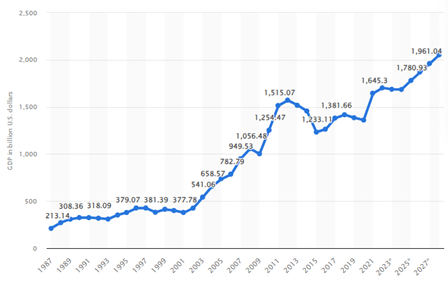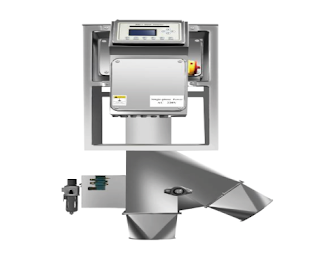The Cutting Edge of Industrial Liquid Filling Machines
Do you manage an industrial production line dealing with fluids? Any experienced professional understands the difficulties of accurately measuring, filling and packaging liquid products. The problem multiplies when you use manual labour that is more expensive per hour, has poor accuracy and leads to lower production rates. Thus, it is a common practice to use liquid filling machines. The Australian GDP stood at USD 1700 billion in 2022 and is expected to cross the USD 2000 Billion mark by 2028. With the rapidly expanding Australian economy, several manufacturing industries are booming. In this competitive environment, investing in state-of-the-art production lines and packaging machines is the only way to beat your rivals.
GDP of Australia from 1987 to 2028
(Source: https://www.statista.com/statistics/263573/gross-domestic-product-gdp-of-australia/)
The vast world of liquid filling machines offers numerous customizations, capacity ranges and liquid categories they are compatible with. To make an informed choice, you must know the most common types and their strengths and weaknesses. Your choice of the liquid filling machine must be done keeping in mind the characteristics like the viscosity of the liquid that you are working with. For example, the filling machines for liquid fertilizers, dairy products and pharmaceuticals each have their distinct specializations. Let us explore the most commonly used categories of liquid filling machines to help you decide:
- Electronic Liquid Fillers: These digital filling machines boast of incredible accuracy while handling the products. With capacities ranging from 2ml to 10000 ml, the electronic fillers come in three varieties: Liquid XS, Liquid S and Liquid M electronic fillers. Being a standalone unit, you can install these either on the conveyor line or a tabletop.
Applications: These electronic filling machines are compatible with almost any liquid like cooking oil, beer, juice, essential oils, vinegar, acids, inks, spirits, perfumes, liquids and even abrasive substances in aqueous solutions.
- Viscous Filling Machine: If you work with high-viscosity products, using conventional liquid fillers does not work. The high density of viscous products demands dedicated solutions. Thankfully, you can use specialised viscous liquid fillers with capacities ranging from 10 grams up to 500 grams. Depending on your requirements you can choose from Flowable S, M, L or XL viscous filling machines.
Applications: High-density products with high viscosity like Gelée Royale, lotions, concealers and foundations, Fingernail UV Gel, hair colours, Polishing gel/ cream, water-soluble lacquers, artist colours (oil/acryl/gouache), wood glue, low-fat yoghurt, drinking whey, sauces, jelly, fruit pulp, water-soluble liquors and paint.
The Leading Manufacturers in Australia
Although there are numerous brands, it is recommended to go with reputed manufacturers for heavy-duty industrial applications. The leading industrial filling machine providers like Optima Weightech boast of their best-in-class customer support. Some of the advantages of choosing Optima Weightech include:
- Modular system: As your business grows, you can scale up your existing machinery instead of starting fresh with each upgrade.
- Electronic operation: Fully digital functionality that does not need media like pressurised air and lowers human involvement.
- German Engineering: Industry-leading German manufacturing process.
In Conclusion
Setting up a production line can be hard. Contact the professionals for assistance while choosing the right machines for your factory and get a tailor-made quote. So what are you waiting for? Visit the website to start your journey.
Source: https://optimaweightech.com.au/news/cutting-edge-of-industrial-liquid-filling-machines/




Comments
Post a Comment